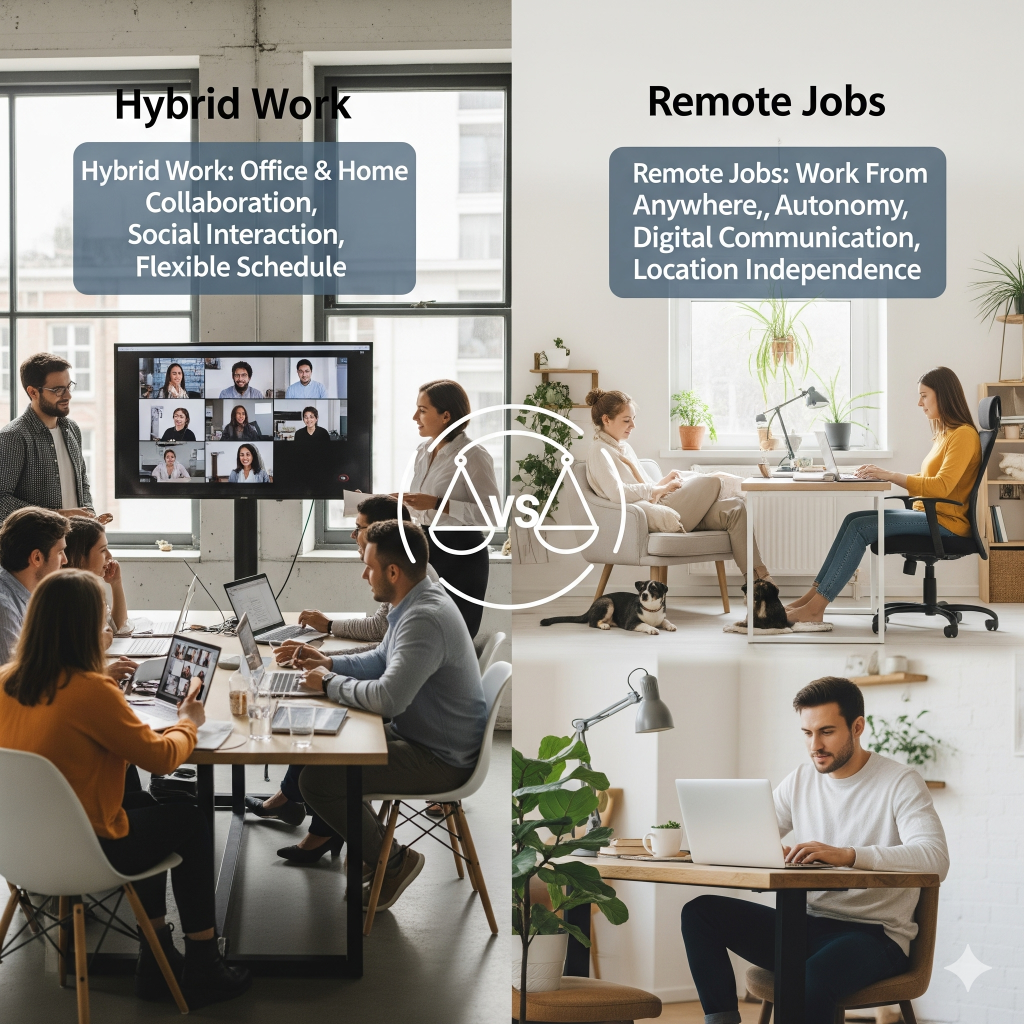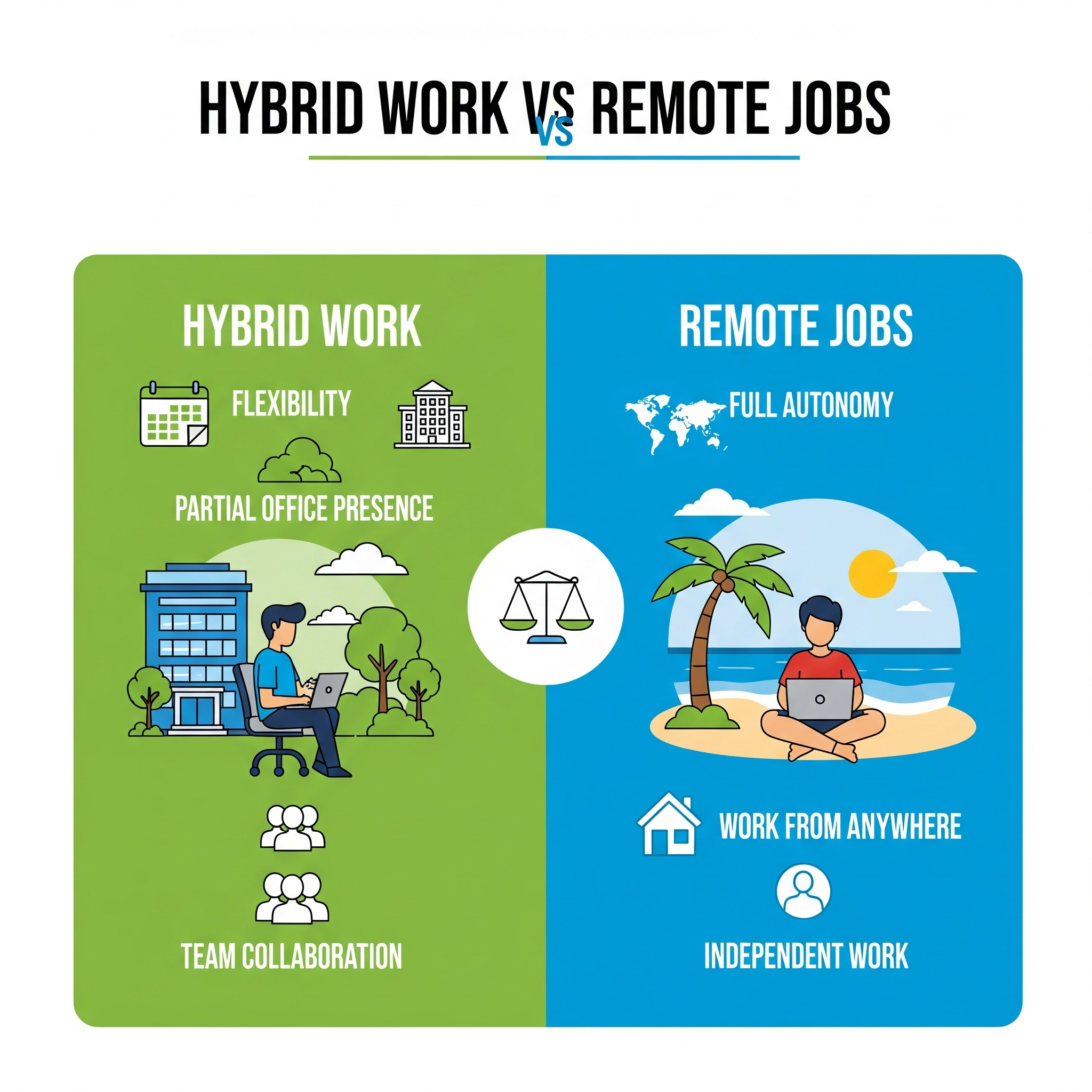Introduction
Hybrid Work vs Remote Jobs has become a central topic in today’s evolving work landscape. Remote jobs proved during the pandemic that employees could be productive from anywhere. Meanwhile, hybrid work combines the flexibility of remote arrangements with occasional office presence, offering the best of both worlds.
The debate around Hybrid Work vs Remote Jobs has intensified as companies adopt flexible work models. Remote jobs skyrocketed during the pandemic, proving that employees could deliver results from anywhere. Now, hybrid work—blending office presence with remote flexibility—is gaining traction.
Employees and organizations are evaluating which model suits them best. Some value the autonomy of fully remote jobs, while others prefer hybrid work for occasional in-person collaboration. This article dives deep into Hybrid Work vs Remote Jobs, exploring benefits, challenges, and what the future holds for the modern workforce.
As companies evaluate productivity, collaboration, and employee satisfaction, understanding the differences between hybrid and remote work is crucial. In this article, we explore Hybrid Work vs Remote Jobs, their benefits, challenges, and what the future may hold for the modern workforce.
You can read the summary here.
What Is Hybrid Work vs Remote Jobs?
The key difference in Hybrid Work vs Remote Jobs lies in location and flexibility. Hybrid work splits time between home and office, maintaining some in-person interaction. Remote jobs allow employees to work entirely from anywhere, giving complete autonomy.
Organizations adopt hybrid work to foster collaboration, reduce office costs, and maintain team cohesion. Remote jobs are ideal for companies seeking global talent or digital-first roles. Both models have their own advantages, depending on the nature of the work and employee preferences.

Key Benefits of Hybrid Work vs Remote Jobs
Hybrid Work vs Remote Jobs offers several advantages. Hybrid work enhances work-life balance by reducing commuting while keeping team interactions intact. Remote jobs provide maximum flexibility, ideal for employees who value autonomy.
From a business perspective, hybrid work improves talent retention and maintains company culture. Remote jobs allow organizations to hire from a geographically diverse pool while reducing operational costs. Both models provide adaptability during emergencies, ensuring business continuity.
Challenges in Hybrid vs Remote Jobs
Despite advantages, Hybrid Work vs Remote Jobs comes with challenges. Hybrid work may create communication gaps due to staggered office schedules. Remote jobs can lead to isolation, affecting collaboration and team bonding.
Performance tracking is another concern. Managers rely heavily on digital tools and regular check-ins for both models. Work-life boundaries can blur in hybrid setups, while remote employees may feel disconnected. Investing in clear policies and reliable technology is essential to overcoming these challenges.
Comparing Hybrid Work vs Remote Jobs: Which Is Right for You?
Choosing between Hybrid Work vs Remote Jobs depends on personal preferences and career goals. Remote jobs suit those seeking full flexibility and minimal commuting. Hybrid work attracts individuals who value occasional office collaboration and structured schedules.
Hybrid work fosters mentorship, networking, and team engagement that remote roles may lack. Remote work is ideal for digital professionals or those needing complete location independence. Understanding your priorities helps in selecting the best work model.
The Future of Hybrid Work vs Remote Jobs
The future workplace will likely include both hybrid and remote models. Hybrid work will dominate industries requiring collaboration and office presence. Remote jobs will persist in digital-first roles, freelance opportunities, and companies hiring globally.
Employees may choose between hybrid and remote roles based on lifestyle and career needs. Organizations that embrace both models benefit from flexibility, improved retention, and operational efficiency. Hybrid Work vs Remote Jobs reflects the trend toward personalized, adaptable work environments.
Conclusion
The discussion of Hybrid Work vs Remote Jobs highlights how flexibility is reshaping workplaces. Hybrid work balances collaboration and autonomy, while remote jobs offer complete freedom. Both models have unique advantages and challenges, and the right choice depends on employee needs and organizational culture.
By adopting clear policies, leveraging technology, and embracing flexible work models, companies can maximize productivity and employee satisfaction. The rise of Hybrid Work vs Remote Jobs is redefining the modern workforce, making flexibility and adaptability essential for long-term success.
For professionals and organizations alike, the hybrid work revolution is a reminder that the workplace is no longer bound by geography it’s defined by how effectively teams can collaborate, innovate, and adapt.Find Your Dream Job Today Explore Endless Career Opportunities and Secure Your Next Role with Best job tool



